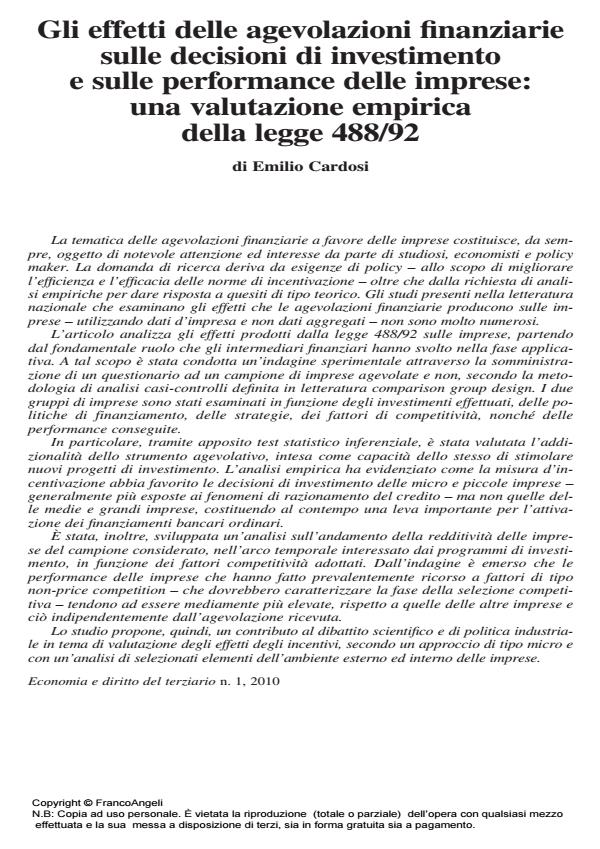Gli effetti delle agevolazioni finanziarie sulle decisioni di investimento e sulle performance delle imprese: una valutazione empirica della legge 488/92
Journal title ECONOMIA E DIRITTO DEL TERZIARIO
Author/s Emilio Cardosi
Publishing Year 2010 Issue 2010/1
Language Italian Pages 39 P. 135-173 File size 1663 KB
DOI 10.3280/ED2010-001006
DOI is like a bar code for intellectual property: to have more infomation
click here
Below, you can see the article first page
If you want to buy this article in PDF format, you can do it, following the instructions to buy download credits

FrancoAngeli is member of Publishers International Linking Association, Inc (PILA), a not-for-profit association which run the CrossRef service enabling links to and from online scholarly content.
The issue of the financial benefits to enterprises has always been the object of considerable attention and interest of scholars, economists and policy makers. The demand for research derives from needs of policy - in order to improve the efficiency and effectiveness of the rules of incentives - as well as by the request of empirical analysis to answer theory questions. Studies in the national literature examine the effects that financial facilities produce on business - using business data and not aggregated data - are not very numerous. This article analyzes the effects produced by law 488/92 on businesses, starting from the fundamental role that financial intermediaries have played during the application stage. For this purpose we submitted an experimental survey with a questionnaire to a sample of facilitated and non facilitated enterprises, according to the methodology of analysis cases-controls defined in literature as comparison group design. The two groups of enterprises were examined in relation to the investments made, funding policies, strategies, competitiveness factors, as well as the performance achieved. In particular, through an appropriate statistical inference test, it was assessed the importance of a financial facilitating instrument, intended as capacity of stimulating new investment projects. This empirical analysis has shown that the measure of incentive favours investment decisions of micro and small enterprises - generally more exposed to the phenomena of credit rationing - but not those of medium and large enterprises, establishing an important lever for activating ordinary bank financing. It was also developed an analysis regarding the progress of the profitability of companies, in the sample considered above, over the time concerned by investment programs, based on the competitiveness adopted. The survey showed that the performance of companies that have made predominantly use of non-price competition - that should characterize the stage of competitive selection - tend to be higher on average than those of other enterprises; and this regardless of the benefits received. The study proposes, therefore, a contribution to the debate in the scientific and industrial policy on the evaluation of effects of incentives, according to a micro-approach and with an analysis of selected internal and external environment elements of the enterprises.
Emilio Cardosi, Gli effetti delle agevolazioni finanziarie sulle decisioni di investimento e sulle performance delle imprese: una valutazione empirica della legge 488/92 in "ECONOMIA E DIRITTO DEL TERZIARIO " 1/2010, pp 135-173, DOI: 10.3280/ED2010-001006